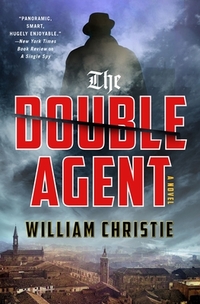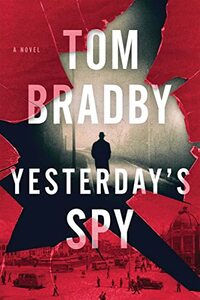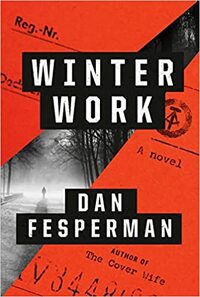JUDAS 62 by Charles Cumming
 Friday, December 9, 2022 at 6:07AM
Friday, December 9, 2022 at 6:07AM 
First published in the UK in 2021; published by Mysterious Press on December 6, 2022
JUDAS 62 continues the story that Charles Cumming began in BOX 88. The book is the second in a series that features Lachlan Kite. It isn’t necessary to read the first to enjoy the second.
Kite is essentially running BOX 88, a clandestine organization that brings together spies from the US and Great Britain, a pairing that isn’t legally sanctioned and that is only known to a few key employees of the CIA and MI6. BOX 88 told the story of Kite’s first assignment. JUDAS 62 tells the story of his second mission. The details of Kite's current predicament are sandwiched around the story of his second attempt to please his spy masters. That mission left some loose ends that, decades later, Kite needs to tie up.
In the present, Kite learns that his name (or rather, the name of the alias he used in BOX 88) is on a Russian hit list (the Judas list). That revelation follows the assassination of a Russian defector who had been given a false identity and a job in Connecticut. Kite resolves to put an end to the assassinations.
The story then pauses as Kite remembers his second assignment for BOX 88. Kite was sent to Russia, where he posed as an English language instructor. Before leaving, he had a tiff with his girlfriend Martha, who got high and canoodled with another guy at a party. Martha eventually resurfaces to complicate Kite’s life.
Kite’s mission in Russia is to exfiltrate Yuri Aranov, a Russian scientist with expertise in biological and chemical weapons. Aranov is willing to defect to the country that offers him the best deal. The British want to make sure that country isn’t Iran or some other nation that might deploy the weapons that Aranov is capable of designing. Aranov has agreed to enroll in the English language class that Kite will teach so he can hear Kite’s pitch.
Kite is confident that one or more of his students works for the FSK and is taking the class to keep an eye on Aranov or Kite or both. Kite nevertheless makes no effort to resist seduction by his most beautiful student, Oksana Sharikova, in part because he’s still miffed at Martha and feels that if he is betraying her, she deserves it for betraying him. Betrayal, of course, if a primary theme in nearly every good spy novel. Oksana was with Aranov before she seduced Kite, but Aranov betrayed her for another woman. Kite worries that Aranov might view Kite’s relationship with Oksana as a betrayal. The reader will worry that Oksana is an FSK honeytrap who will betray Kite.
Illicit border crossings are a classic component of spy fiction. Cummings builds suspense as the reader wonders whether and how Kite and Aranov will make it out of Russia. Cummings tosses in enough complications to make those worries palpable. The story then shifts back to the present, where Kite decides that a Russian defector who is on the Judas list should be moved to Dubai and dangled as bait for Mikhail Gromik, a Russian intelligence officer Kite first encountered in BOX 88. The plot will imperil the double agent England has planted in the FSB (BOX 88’s source of information about the Judas list), creating additional suspense in a story that regularly places sympathetic characters in harm’s way.
An interesting side note in JUDAS 62 involves the difficulty that male spies have keeping it in their pants. Kite nearly messed up his assignment in BOX 88 because his attention was diverted by a hot young woman. Kite does the same thing in first half of JUDAS 62, when he was still a young and relatively new spy. Late in the novel, another spy breaks a woman’s heart because of his opportunistic approach to sex — if the opportunity is there, he seizes it. Cumming suggests that the thrill and danger of being a spy encourages men to seek inappropriate sexual release, but it could just be that they are being guys — guys who have the personalities and looks to succeed both at spying and seduction. In any event, while the sexual adventures of the characters are not presented in graphic detail, they add some spice (and extra drama) to the story. To his credit, Cumming recognizes the harm caused to sincere women who are used for the sexual convenience of men.
Another interesting side note is wrapped up in a speech that Kite gives at the end of the novel as he encourages another spy to remain with the organization. Intelligence agencies exist to collect information, Kite proclaims, but the problem with the world is not the absence of information but the flood of untrustworthy information. In Russia and China, state-controlled media tell residents what to believe. In the US, liars on social media tell Americans what to believe. And sadly, too many people believe the lies. “It’s a question of whether people are smart enough to realise that they’re being manipulated,” Kite says. The other problem is that people in power want to remain in power and will “do everything they can to remain in place.” Spreading misinformation helps them achieve that goal. Kite wants good people to “make it as difficult as possible for corrupt people and those who serve them to remain in power and manipulate the truth.” The point Kite makes is clearly not limited to spies.
I enjoyed BOX 88 and I enjoyed JUDAS 62 even more, in part because we get to see more of Kite as an older, more mature man. The plot in the new book is also more complex, particularly with regard to events in the present. Cumming has a long history of producing capable spy fiction. He’s doing some of his best work in the BOX 88 series.
RECOMMENDED
 TChris |
TChris |  Post a Comment |
Post a Comment |  Charles Cumming,
Charles Cumming,  spy in
spy in  Thriller
Thriller 


